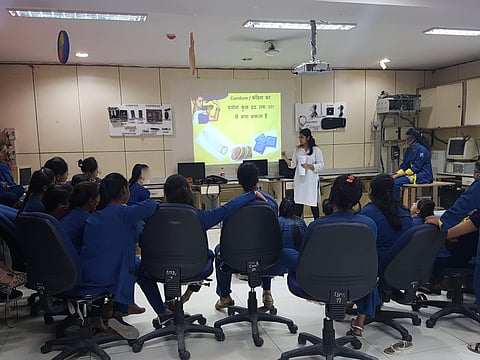

Amidst the current wave of the #MeToo campaign, the definition of consent has come up numerous times and it still remains dicey. A huge percentage of our population, especially girls, within the age of 20 to 25 years are not aware of safe sex, contraception, safe periods and consent. In an attempt to bridge the gap, Super School India (SSI), an NGO based in Delhi, is running several education initiatives for urban slum children to make them aware of such concepts and is guiding them to become morally upright members of the society.
Started in 2015, SSI is the brainchild of Radhika Mittal and it believes that each and every child can excel if provided with proper guidance and skills. Radhika and her team at SSI have devised a unique methodology to teach these children about consent and proper civic sense and values.
Radhika explains that for instance, if a child had a cup of tea with someone for two consecutive days but was refused on the third day, the refusal must be respected on both sides. "We explained to them that forcing someone to have tea should not be an option, and similarly consent must be obtained for anything that involves another person," elaborates Radhika, adding, "Manzuri chai ki tarah hoti hai (consent is like tea), a girl may have spoken to you openly about sex but that doesn't imply she wants to sleep with you." Radhika says that this popular analogy worked pretty well with these children and she laughs while telling us about a session where they received a response, "We had someone tell us that in India refusing tea was considered rude."
Through their years of interacting with underprivileged children, Radhika says that they have observed two important areas that warrant attention: quality English speaking education and sex education. "Sex education will continue to be a major focus area as I believe it needs lifelong intervention. We have already impacted 5,000 students as we tied up with schools for delivering our programs and in the next two years our goal is to have an effect on 10,000 children," concludes Radhika.
Radhika says that for her NGO and her this has been a good beginning. Their English speaking programs are still in its initial phase, however, it has been designed to impact 150 children and they are planning to reach out to 5,000 students in one year. "I set this organisation up three years as I felt a lot of fixing is needed to be done in our education system. This realisation occurred when I was studying in Singapore at a government school. Being a Delhiite, I was surprised when my parents told me that they were enrolling me to a government school in Singapore. However, my perspective changed completely when I reached there. I studied there for four years and noticed that the schools provided equal opportunity and platform for everyone. I wanted to make a difference in my own country, and that's when I moved back here and started working with urban slum children. At first, I began interacting with slum kids near my house in Delhi, spoke to them and tried to figure out what is lacking, and finally designed programs to help them," says Radhika.
For more information on SSI and for volunteering at their centres, you can visit their website here.
